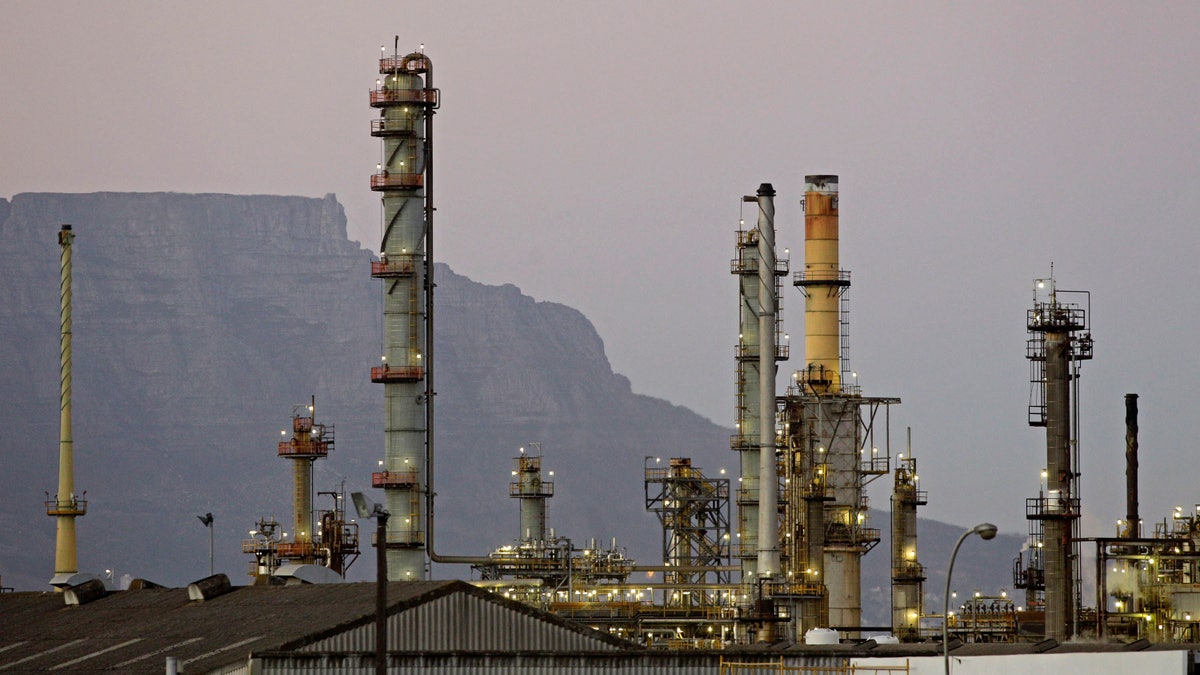
Feb. 8, 2012: An oil refinery is seen with Table Mountain in the background, Cape Town, South Africa. (AP2012)
JOHANNESBURG -- The West's increasing pressure on Iran has meant scrutiny for South African businesses that operate in the Middle Eastern nation accused of having nuclear ambitions.
South African-Iranian political ties have long been close, and that has meant close business ties. A politically connected South African telecommunications company has been accused of pushing Pretoria to support Iran's nuclear power program. A South African energy and chemicals company is reviewing its Iranian investments. Iranian oil makes up nearly a third of South Africa's oil imports.
Iran denies charges from the United States and its allies that it is trying to produce an atomic weapon and says its nuclear programs are for energy and other peaceful needs.
South Africa, the only nation in the world to have voluntarily surrendered a nuclear weapons program, says all nations should have the right to exploit atomic energy's peaceful potential. South Africa has uranium reserves and its own nuclear power program.
Foreign affairs department spokesman Clayson Monyela said this week that South Africa has told Iran that it is ready to help any country that wants to follow its lead and give up nuclear weapons.
South Africa began disarming in the waning years of apartheid in the early 1990s, and has submitted itself to International Atomic Energy Agency verification that it dismantled its nuclear weapons.
Thomas Wheeler, a retired South African diplomat, said Iran's "problems would go away" if, as South Africa did, it allowed the international agency full access.
Instead, Iranians "create the suspicion that they're up to something," said Wheeler, who now works for the independent South African Institute of International Affairs.
Wheeler said South African-Iranian ties are close, but complicated. He said Iran supported the ANC when it was an anti-apartheid movement, but also supplied oil to the white minority government both before and after the shah's fall.
On Monday, trying to pressure Iran to divert from what the West sees as a drive toward a nuclear bomb, the United States gave U.S. banks additional powers to freeze assets linked to the Iranian government and close loopholes that officials say Iran has used to move money despite earlier restrictions imposed by the U.S. and Europe. In January, the European Union announced it would ban Iranian crude oil imports starting in July. The U.S. doesn't buy oil from Iran.
Monyela, of the South African foreign affairs department, said that so far, Western moves against Iran have not affected South African policy. But he did not rule out a possible shift.
South Africa has often expressed concerns that the West is hiding its true intentions when it calls for steps against a developing country. South Africa has complained, for example, that a U.N. resolution calling for protecting civilians in Libya was misused. South Africa supported the resolution, then argued that a NATO bombing campaign that followed amounted to an illegal, violent attempt at regime change.
While diplomats may be slow to act for political reasons, South African business may have little room to maneuver. The U.S. move on banks could make it hard to pay Iran for its oil. And having close business ties with Iran might make it hard to do business in the U.S. and Europe.
Last week, Sasol, a major South African energy and chemicals company, said it was reconsidering its business ties. Sasol added that Iran supplies it about 12,000 barrels a day of crude.
"In view of recent developments regarding trade restrictions and possible oil sanctions against Iran, Sasol Oil is diversifying its crude oil sourcing, to mitigate risks associated with oil supply disruptions from the Middle East," Sasol said.
Another major South African company, MTN, owns 49 percent of the Iranian mobile company Irancell. A Turkish company that was an unsuccessful bidder for a telecommunications license in Iran has hinted it will challenge the MTN deal by arguing in U.S. courts that MTN bribed an Iranian and a South African government official, and encouraged South Africa to support Iran's nuclear power development program at a meeting of the International Atomic Energy Agency.
Politics are likely to continue to effect business.
Last month, South African foreign affairs minister Maite Nkoana-Mashabane told reporters the way forward was for the international community to ensure weapons inspectors were able to do their jobs and to campaign for the peaceful use of nuclear power, "not just to target Iran as a country."




















